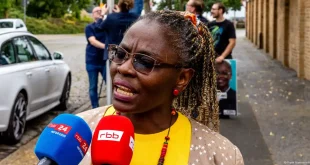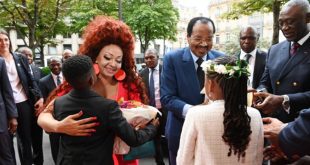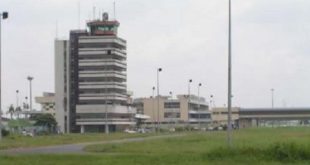On a bright morning at Les Normaliens Lay Private Bilingual School in Foumbot, Cameroon, teacher Belinda Bafon prepared her students for class. Settling in, the children delved into a 30-minute session dedicated to conversing in their mother tongues, a practice central to the school’s curriculum.
YAOUNDE, Feb. 22 (Xinhua) — On a bright morning at Les Normaliens Lay Private Bilingual School in Foumbot, Cameroon, teacher Belinda Bafon prepared her students for class. Settling in, the children delved into a 30-minute session dedicated to conversing in their mother tongues, a practice central to the school’s curriculum.
“Who can say ‘good morning, how are you’ in their mother tongue?” Bafon asked as the children raised their hands almost in unison in a scramble to respond to the question.
“Irah weh? Weh sa keh?” responded six-year-old Gift Legend Fohyi, who was lucky to be chosen by the teacher.
The students were often asked to pronounce words and give names of things in their mother tongues. Bafon’s lecture reflects a typical classroom setting in the country, where a new government policy has made it mandatory to teach mother tongues to children in kindergartens, primary, and secondary schools.
This classroom scene mirrors a broader educational shift in Cameroon. Institutions like Les Normaliens Lay are leading the charge to preserve and promote indigenous languages, recognizing them as vital components of the country’s cultural identity. Through such initiatives, Cameroon not only educates its youth but also fosters pride and belonging rooted in linguistic heritage.
Cameroonian culture remains intact, but one important part of indigenous identity — language — is fading out. There are about 260 indigenous languages in the country, but only French and English, inherited from colonial masters, are official, according to the Ministry of Secondary Education.
In 2022, the state-run National Institute of Statistics of Cameroon reported that 4 percent of the indigenous languages have disappeared since 1950, with 10 percent of them currently neglected, and 7 percent considered as threatened.
Cameroon is now making progress in fostering the teaching of mother tongues in schools as part of efforts to revive local languages, said Secretary of State to the Minister of Basic Education Kilo Vivian Asheri.
“We insist on teaching mother tongues because when a child grows up and the first language they acquire is their mother tongue, they will understand other languages,” Asheri said.
“When introducing the national language, we deal with nearly all the languages,” Bafon told Xinhua.
“I was happy when I came to school because I was learning my dialect,” added little Fohyi.
At Progressive English Nursery and Primary School in Bafoussam, the chief town of the West Region, Gilles Ndze was attentive as his teacher taught them how to spell their local languages.
The 10-year-old said learning how to speak his mother tongue “helps us communicate with those who know our local languages and also helps us know our national culture.”
Learning a native language can be a meaningful way to explore and connect with the heritage, which is largely believed to contribute to a longer and healthier life, said Clarisse Ndam Meganche, an educator and proprietor of Les Normaliens Lay Private Bilingual School.
“Teachers, parents, educators should teach their children to speak a national language; it is very important for their personal development because wherever they are, they must have an identity, and identity is tested through language,” she said.
The revival of mother tongues through education is also an important component of the country’s reforms to enhance social integration and unity, said Emmanuel Kelly Fuh, the headmaster of Progressive English Nursery and Primary School.
“Children will be able to discuss with their parents and others who may not have gone to school, who are still in the village. They will be able to discuss with them without any problem and identify their culture,” Fuh said.
As Cameroon joins the rest of the world in marking the International Mother Language Day, which falls on Feb. 21, it is important to emphasize the need to decolonize Africa through the teaching of local languages, said linguist Joseph Maluh.
“This program is, at its core, a solid example of what decolonization looks like. It will gradually erase the language of the former colonial master while giving importance to local languages. And while it will take a while to get a framework in place to expand this program all over Cameroon, supporting it will be crucial,” Maluh said.
 CameroonOnline.org Cameroon news, Actualité Camerounaise, live Web TV & Radio, World News and a lot more
CameroonOnline.org Cameroon news, Actualité Camerounaise, live Web TV & Radio, World News and a lot more





Wise policy ,like Luxembourg.,which dosnt have the richness of 260 .